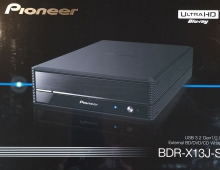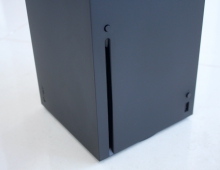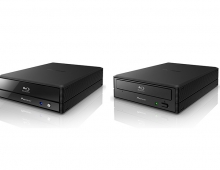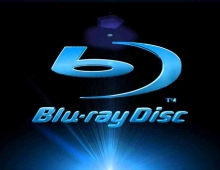
CES: Next Generation DVD Format Duel Intensifies
Toshiba unveiled the first HD DVD players at the CES in Las Vegas, promising availability in the US market in March for less than US $500. On the other hand, rival Sony still bets on the spring release of the Playstation 3 game console and promises an as-yet-unpriced Blu-ray player by the end of the year, in conjunction with an external computer drive that will play and record the Blu-Ray discs.
HD DVD
The HD DVD camp announced pricing details for its upcoming HD DVD players. Toshiba said it will start shipping its HD-XA1 and HD-A1 players in the US in March this year. They will be selling for $799 and $499 respectively.
The premium model offers a high end look as well as USB connectors to connect gaming peripherals. Both models support high definition (720p) and 1080i (ultra HD) screen resolutions, internet connectivity and high quality sound.

The vendor also unveiled a model of its Qosmio line of laptop computers equipped with a HD DVD drive, but didn't provide a projected shipping date or retail pricing.
The Toshiba launch didn't come as a big surprise as the company late last year was forced to delay the launch of its HD DVD players.
Thomson announced today the company's plan to launch a HD DVD player at $499 in the second quarter. The company's spokesman said the introduction of Blu-ray players "could still happen, but for now, we are sticking to HD DVD."
HD DVD Promises 200 Movies
Paramount Pictures, Universal Studios, HBO Video, New Line Entertainment and Warner Home Video stood up with Toshiba at the Computer Electronics Show and pledged that movies such as "Million Dollar Baby," "Harry Potter 4: The Goblet of Fire," "Blazing Saddles," "Full Metal Jacket" and "Jarhead" (not to mention box office clunkers like "Sahara" and "Sky Captain and the World of Tomorrow") would come out this year on HD DVD disks.
Europe's Studio Canal and the Weinstein Co., responsible for hits such as "Shakespeare in Love," also will come out with movies in the HD DVD format, according to the HD DVD Promotion Group.
Blu-Ray
Sony's most anticipated high-definition product remains the PlayStation 3, which is still expected to be released this spring, at least in Japan. But the company said Wednesday that it will also release, in the summer, an as-yet-unpriced Blu-ray player called the BDP-S1, and, by the end of the year, an external computer drive that will play and record the Blu-Ray discs. BD technology will also be included in VAIO computers.
The company's RC series VAIO desktop computer will combine Blu-ray Disc recording technology with high-octane performance, allowing aspiring HD movie makers and other videographers to shoot their creation with a high-definition camcorder. Using Sony's VEGAS software, users can edit high-definition footage, then archive and share it on Sony high-capacity BD-R and BD-RE Blu-ray Discs or on traditional DVD-R/RW, DVD+R/+RW discs. RC series desktops will be available with the drive in early summer.
As VAIO expands its line of digital home products Blu-ray Disc drives will be progressively integrated.
Sony also announced that a Blu-ray Disc aftermarket drive for personal computers is also expected to be available this year, and will support 25GB/50GB BD-R/RE discs, as well as DVD+R/+RW, and CD-R/RW recordable media. This drive will be bundled with consumer-level BD recording software and accessories for creation of High-Definition home video and data Blu-ray Discs.

Beginning in the spring, Sony will begin selling a 25GB single layer BD-R and the BD-RE recording media. Dual layer 50GB capacity recordable media will follow in the subsequent months. Recordable Blu-ray Discs utilize Sony's AccuCORE technology promising reliability, scratch guard protection and temperature durability.
Sony also demonstrated playback of HD video stored on a Blu-Ray disc. The interesting part here is that the disc was reproduced using the development tool kit of a Playstation 3 game console, giving visitors a glimpse of what they should expect from Sony's next game console. The reference playback tool kit was connected to a Sony high-def TV through an HDMI interface.
Pioneer has already announced its BDR-101A Blu-Ray recorder for PCs, which is expected to start shipping at the end of January, 2006 for US$995. The company also showcased the Pioneer BDP-HD1 Blu-ray player, which is scheduled to hit the US market in May, for US $1,800. The device bundles 1080p output and 1080p video upconvert, and supports DTS-HD, DTS and Dolby Digital. Besides an HDMI jack for one-cable hookup, the BDP-HD1 will be able to network with any DLNA-compliant server or any PC running Windows Media Connect.
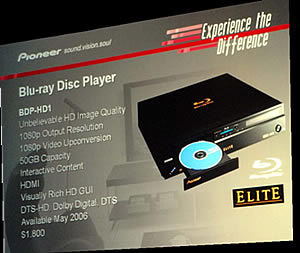
This summer, Panasonic will launch Blu-ray players at an undisclosed price. Philips has promised delivery of the company's Blu-ray players in the second half this year. The Dutch company made no pricing information available. LG Electronics is introducing its Blu-ray players "in April or May," but offered no price.
Two more Blu-ray supporters, Samsung and Sharp, said at the show that they planned to release machines this year costing $1,000 to $1,800. Samsung's BD-1000 will be the company's first U.S. Blu-Ray player, which is expected to be available for around US $1,000 in the springtime. HDMI output is included, and the player will be backwards compatible with most of today's standard DVD formats (DVD-RAM, DVD-RW, DVD-R, DVD+RW, and DVD+R).
Philips also announced that its "TripleWriter" Blu-Ray recorder for PCs as well as the BDP9000 Blu-Ray player will be available in the second half of 2006.
The strategy of the two camps appears to be taking two different directions. While the HD DVD group seems more intent on hitting the market as soon as possible at a competitive price, Blu-ray promoters remain vague about their launching schedules and pricing.
Though less evident in these product announcements, the lack of Advanced Access Content System (AACS) licensing could still delay the final product launch for either HD DVD or Blu-ray players, as both systems use AACS. It is possible that the HD DVD camp will not enjoy a time-to-market advantage because both groups are waiting for the AACS group to finish work on copy protection. Issues still being debated at AACS include licensing terms, whether to allow HD analog out for older HDTVs and the compliance rules for managed copies.
Chris Buma, program manager at Philips Consumer Electronics, noted that the AACS group agreed to offer "an interim license," while it is still working on the final AACS spec, including such issues as whether AACS permits an analog out, according to reports appeared on the EETimes.com website.
Tthe situation could be even more complex for Blu-ray promoters. Everyone doing a Blu-ray player needs to implement both AACS and yet another copy protection system called BD+.
BD+, designed to augment AACS, is derived from a set of technologies from a company called Cryptography Research Inc (CRI). Sony and Panasonic took and modified CRI?s technology called Self Protecting Digital Content (SPDC), rather than licensing it straight from CRI. They also adapted it to the needs of Fox, while at the same time simplifying it somewhat for the BD spec, according to industry sources.
HD DVD proponents, including Microsoft, believe that AACS and BD+ could seriously delay Blu-ray for both CE and PC company implementation of Blu-ray.
The HD DVD camp announced pricing details for its upcoming HD DVD players. Toshiba said it will start shipping its HD-XA1 and HD-A1 players in the US in March this year. They will be selling for $799 and $499 respectively.
The premium model offers a high end look as well as USB connectors to connect gaming peripherals. Both models support high definition (720p) and 1080i (ultra HD) screen resolutions, internet connectivity and high quality sound.

The vendor also unveiled a model of its Qosmio line of laptop computers equipped with a HD DVD drive, but didn't provide a projected shipping date or retail pricing.
The Toshiba launch didn't come as a big surprise as the company late last year was forced to delay the launch of its HD DVD players.
Thomson announced today the company's plan to launch a HD DVD player at $499 in the second quarter. The company's spokesman said the introduction of Blu-ray players "could still happen, but for now, we are sticking to HD DVD."
HD DVD Promises 200 Movies
Paramount Pictures, Universal Studios, HBO Video, New Line Entertainment and Warner Home Video stood up with Toshiba at the Computer Electronics Show and pledged that movies such as "Million Dollar Baby," "Harry Potter 4: The Goblet of Fire," "Blazing Saddles," "Full Metal Jacket" and "Jarhead" (not to mention box office clunkers like "Sahara" and "Sky Captain and the World of Tomorrow") would come out this year on HD DVD disks.
Europe's Studio Canal and the Weinstein Co., responsible for hits such as "Shakespeare in Love," also will come out with movies in the HD DVD format, according to the HD DVD Promotion Group.
Blu-Ray
Sony's most anticipated high-definition product remains the PlayStation 3, which is still expected to be released this spring, at least in Japan. But the company said Wednesday that it will also release, in the summer, an as-yet-unpriced Blu-ray player called the BDP-S1, and, by the end of the year, an external computer drive that will play and record the Blu-Ray discs. BD technology will also be included in VAIO computers.
The company's RC series VAIO desktop computer will combine Blu-ray Disc recording technology with high-octane performance, allowing aspiring HD movie makers and other videographers to shoot their creation with a high-definition camcorder. Using Sony's VEGAS software, users can edit high-definition footage, then archive and share it on Sony high-capacity BD-R and BD-RE Blu-ray Discs or on traditional DVD-R/RW, DVD+R/+RW discs. RC series desktops will be available with the drive in early summer.
As VAIO expands its line of digital home products Blu-ray Disc drives will be progressively integrated.
Sony also announced that a Blu-ray Disc aftermarket drive for personal computers is also expected to be available this year, and will support 25GB/50GB BD-R/RE discs, as well as DVD+R/+RW, and CD-R/RW recordable media. This drive will be bundled with consumer-level BD recording software and accessories for creation of High-Definition home video and data Blu-ray Discs.

Beginning in the spring, Sony will begin selling a 25GB single layer BD-R and the BD-RE recording media. Dual layer 50GB capacity recordable media will follow in the subsequent months. Recordable Blu-ray Discs utilize Sony's AccuCORE technology promising reliability, scratch guard protection and temperature durability.
Sony also demonstrated playback of HD video stored on a Blu-Ray disc. The interesting part here is that the disc was reproduced using the development tool kit of a Playstation 3 game console, giving visitors a glimpse of what they should expect from Sony's next game console. The reference playback tool kit was connected to a Sony high-def TV through an HDMI interface.
Pioneer has already announced its BDR-101A Blu-Ray recorder for PCs, which is expected to start shipping at the end of January, 2006 for US$995. The company also showcased the Pioneer BDP-HD1 Blu-ray player, which is scheduled to hit the US market in May, for US $1,800. The device bundles 1080p output and 1080p video upconvert, and supports DTS-HD, DTS and Dolby Digital. Besides an HDMI jack for one-cable hookup, the BDP-HD1 will be able to network with any DLNA-compliant server or any PC running Windows Media Connect.

This summer, Panasonic will launch Blu-ray players at an undisclosed price. Philips has promised delivery of the company's Blu-ray players in the second half this year. The Dutch company made no pricing information available. LG Electronics is introducing its Blu-ray players "in April or May," but offered no price.
Two more Blu-ray supporters, Samsung and Sharp, said at the show that they planned to release machines this year costing $1,000 to $1,800. Samsung's BD-1000 will be the company's first U.S. Blu-Ray player, which is expected to be available for around US $1,000 in the springtime. HDMI output is included, and the player will be backwards compatible with most of today's standard DVD formats (DVD-RAM, DVD-RW, DVD-R, DVD+RW, and DVD+R).
Philips also announced that its "TripleWriter" Blu-Ray recorder for PCs as well as the BDP9000 Blu-Ray player will be available in the second half of 2006.
The strategy of the two camps appears to be taking two different directions. While the HD DVD group seems more intent on hitting the market as soon as possible at a competitive price, Blu-ray promoters remain vague about their launching schedules and pricing.
Though less evident in these product announcements, the lack of Advanced Access Content System (AACS) licensing could still delay the final product launch for either HD DVD or Blu-ray players, as both systems use AACS. It is possible that the HD DVD camp will not enjoy a time-to-market advantage because both groups are waiting for the AACS group to finish work on copy protection. Issues still being debated at AACS include licensing terms, whether to allow HD analog out for older HDTVs and the compliance rules for managed copies.
Chris Buma, program manager at Philips Consumer Electronics, noted that the AACS group agreed to offer "an interim license," while it is still working on the final AACS spec, including such issues as whether AACS permits an analog out, according to reports appeared on the EETimes.com website.
Tthe situation could be even more complex for Blu-ray promoters. Everyone doing a Blu-ray player needs to implement both AACS and yet another copy protection system called BD+.
BD+, designed to augment AACS, is derived from a set of technologies from a company called Cryptography Research Inc (CRI). Sony and Panasonic took and modified CRI?s technology called Self Protecting Digital Content (SPDC), rather than licensing it straight from CRI. They also adapted it to the needs of Fox, while at the same time simplifying it somewhat for the BD spec, according to industry sources.
HD DVD proponents, including Microsoft, believe that AACS and BD+ could seriously delay Blu-ray for both CE and PC company implementation of Blu-ray.


